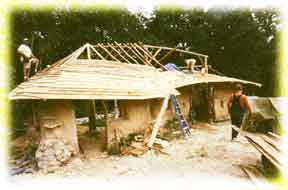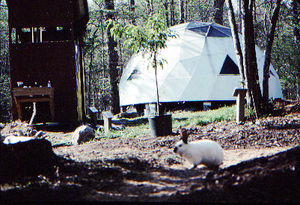
This page provides an overview of eco-hostels in the United States. While comparatively popular worldwide (see Overview of Eco-Hostels), eco-hostels are a new type of accommodation in the United States.[verification needed] Among hundreds of hostels in the US, this article shows six that market themselves as eco-hostels.
What is an eco-hostel?[edit | edit source]
Eco-hostels combine the hallmarks of "hostel" style lodging -- a low price, self-catering, overnight stay, and usually a dormitory-style option for sleeping -- with a low energy-footprint infrastructure and lifestyle. They can provide an affordable and relatively "green" place to stay away from home.
Eco-tourism generally relies on the integrity of the local environment to attract visitors. It makes good ecological sense and good business sense for hospitality operations serving the eco-tourism sector to help protect and educate about their local environment and to demonstrate low-impact lifestyles. The hospitality industry is generally not highly regulated on environmental issues, so current efforts are typically being undertaken by relatively small number of ecologically conscious owners and operators who serve as a demonstration of what the industry could look like.[1]
Hostelling International (HI) lays out 7 areas of concern in its Environmental Charter, summarized here, and these can serve as a useful basis for defining the traits of an Eco-Hostel.
- Energy Conservation: Use as little as possible.
- Recycling: Recycle everything economically feasible.
- Pollution: Minimize it.
- Transport: Encourage public and low-carbon transport.
- Nature: Support local parks and reserves and treat own land ecologically.
- Environmental Education: Encourage and aid in promoting green living and awareness.
- Consumption: Reduce, re-use, localize.
What are the benefits of staying at an eco-hostel (for me and for the planet)?[edit | edit source]
- Staying at an eco-hostel can help reduce your energy and waste footprints while traveling! Use less energy. Use less water. Create less waste.
- Perhaps even more importantly, eco-hostels can provide a live-in demonstration of low-footprint green lifestyles and teach skills that apply to any home situation. As one green design review states, "In addition to sustainable building practices, it is the small and simple efforts taken by individuals to consciously reduce their carbon footprints that help make an impact."[2]
- Eco-hostels can help a traveler connect with the local green community and projects and to find information about the local area and its environmental and cultural issues.
What should be considered when planning to create an eco-hostel?[edit | edit source]
- Location: Regional differences can include climate, technology expenses, as well as labor expenses. Depending on the climate of the area, there may be different technologies needed, and the expense of running them can differ. The cost of labor for a green building project can differ as well, depending on whether you are in an area where there are many contractors experienced with green building and if they have competitive fees.[3]
- Cost: "Green building practices can increase up-front costs but may also provide long-term benefits, including financial, environmental, and health benefits."[3] Some energy efficient appliances and materials may cost the same as non-energy efficient appliances or materials, but this is not always the case. Often the technologies that conserve energy and resources are more expensive up front. However, over time the benefits increase, including possible health benefits from using materials that do not contain VOCs, and financial benefits from decreased water and energy bills due to efficient appliances. Some travelers have indicated a willingness to pay slightly higher prices to ensure that their lodging is embracing renewable energy and technologies, though American travelers are less interested than Australians.[4]
Why aren't there more eco-hostels in the U.S.?[edit | edit source]
Two reasons seem to explain why the U.S. does not have more eco-hostels. As mentioned above, the up-front cost can be a deterrent to getting the project off the ground, as can the extra planning that is necessary. Secondly, many people traveling away from home are on vacation. American conceptions of vacation are often dominated by relaxation. Many vacationers do not want to worry about going out to the organic garden to help gather food and make their own meals, or to try to figure out how to use a composting toilet. Such high-effort and educational activities are often not involved in the typical idea of an American vacation.[verification needed]

Where can I find an eco-hostel in the United States?[edit | edit source]
For an international view of eco-hostels, see Eco-Hostels. There are two basic types of eco-hostels in the US:
- Traditional hostels that are implementing "green" policies and procedures.
- Destination eco-hostels that are typically located in a more natural setting and have been built from the ground up to embody sound ecological practice in building design and accommodation style.
So far, only five existing hostels (and one under construction) in the US that fit one of these two categories are compared and linked in the table below. Please add more.
Hostels Compared by Category[edit | edit source]
| Name | Location | Waste* | Waste reduction methods | Construction | Green Design/Construction | Energy* | Energy use policies | Water* | Water use policies | Land * | Land Use | Eco-Ed* | Eco-Educational Activities | Price ** |
|---|---|---|---|---|---|---|---|---|---|---|---|---|---|---|
| Hedonesia | Pahoa, HI | 5 | - Recycling - Compost |
4 | -Reused/Renewable - Guava, bamboo, recycled tent |
3 | -Grid-tied geothermal electric | 2 | Outdoor "pee-garden" | 5 | - Organic food garden - Tropical garden |
3 | - Buildings are green demonstrations | $15 - $25+ (Work-trade available) |
| The Farm | Summertown, TN | 4 | - Recycling |
4 | - Natural/Recycled - Strawbale, Cobb |
5 | - Solar PV - Solar hot water - CFL/LED lighting |
4 | - Rainwater harvesting - Drip irrigation |
5 | - Food gardening - Swales |
5 | - Permaculture, natural building and eco-skills retreats - Guided nature walks/mushrooming |
$12+ (Work-trade available) |
| Hostelling Intl. - Boston | Boston, MA | 4 | -Recycling - Flip-flop donation program - Green cleaning |
2 | - Recycled carpet - Low VOC paint |
2 | -CFLs - Efficient appliances |
1 | Low-flow plumbing | 1 | Urban | 1 | Motivational signs for green habits | $40+ |
| Hostelling Intl. – DC | Washington, DC | 3 | - Recycling - Recycled carpet - Purchase recycled paper goods |
2 | -Low VOC paint & carpet | 2 | - Energy-star certified - CFLs - Linen re-use |
3 | - Award winning - Low-flow timer faucets - Linen re-use |
1 | Urban | 2 | Environmental documentaries shown | $35+ |
| Portland Hawthorne Hostel | Portland, OR | 2 | - Recycling | 3 | - Living roof | 1 | - | 3 | - Rainwater harvesting / Living roof | 1 | Urban | 3 | -Educate about green roof | $20+ |
| Humboldt Bay Ecohostel | Samoa, Humboldt Co., CA | 4 | - Recycling - Reused/Recycled building materials |
4 | - Living roof - Recycled materials - Experimental eco-cottages |
4 | - Solar PV - Efficient appliances - On-demand water heating |
4 | - Greywater pond - Composting toilets |
3 | - Greywater pond - Participatory Organic garden |
4 | - Demonstrates green building - Visible water/energy use monitors |
-TBA/Cheap |
* Scale is 0 to 5, with 5 being most eco.
**Price indicated is for cheapest single accommodations: dorm, hammock, tent-site, etc.
References[edit | edit source]
- ↑ International Journal of Hospitality Management 27 (2008); p. 132.
- ↑ Kolleeny, Jane Linn, Charles. Emerald Architecture: Case Studies in Green Building. McGraw-Hill, 2008. p.115.
- ↑ 3.0 3.1 Government Accountability Office, Green Affordable Housing: HUD Has Made Progress in Promoting Green Building, but Expanding Efforts Could Help Reduce Energy Costs and Benefit Tenants, October 2008.
- ↑ Renewable Energy Volume 33, Issue 10, October 2008, Pages 2174-2185